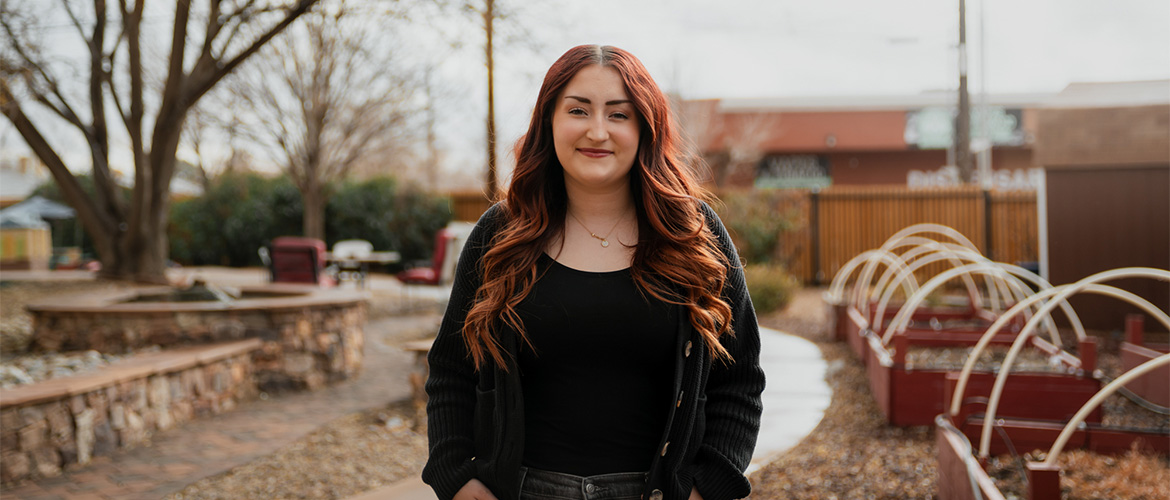Isabelle Dopson cried tears of happiness as she hugged a client and told the single mother of two she qualified for a housing program that would allow her family to live independently.
“We’re finally going to have a home,” said the client, awash in relief. “I can finally sleep at night.”
While staying at Albuquerque’s Barrett House shelter, the woman had become increasingly anxious and hopeless as a deadline loomed to secure long-term housing within six months.
“She is working a full-time job, trying to get her kids to school, while managing medical and mental health issues,” says Dopson, Barrett House’s case manager, who connected the client with a program offered by the New Mexico Coalition to End Homelessness.
“She’s been out on her own since she was a very young age,” Dopson says. “Just giving her that news — that is my motivation for doing what I do.”
A $40,000 Blue Impact℠ grant from Blue Cross and Blue Shield of New Mexico provides case management to support unhoused women achieve self-sufficiency through stable housing, employment, education and healthcare. Dopson works with each resident to find sustainable housing, as well as supplement employment, health and housing expenses residents typically face like buying uniforms, paying for doctor’s appointments and coming up with move-in deposits.
Barrett House accommodates as many as 40 unhoused women and children up to six months, and many of them stay that long. And it’s always nearly full. Holly Durante, development director for Barrett Foundation, says rising housing, food and health care costs, coupled with stagnant or low wages, have led more women in search of the nonprofit’s services.
In New Mexico, more than half of women at least age 16 work full time and year-round, earning a median $35,000 annually, according to the Institute of Women’s Policy Research. More than 20% of women at least age 18 live in poverty.
Meantime, homelessness skyrocketed 50% between 2022 and 2023, the state’s latest housing needs assessment found. New Mexico’s median monthly rent has increased nearly 17% since 2018.
“This is the only women’s shelter in the area that allows a six-month stay,” Dopson says. “We get floods of calls from people. The phone is nonstop ringing all day.”
With the Blue Impact grant program, BCBSNM awarded $860,000 to 25 community organizations statewide in 2024. The program invests in organizations working to address social and economic drivers of health, including economic opportunity and stability.
“We’re proud to support the Barrett Foundation to provide essential vocational and housing support to women and their families,” says BCBSNM President Janice Torrez. “Their work in helping shelter residents access fundamental resources and achieve economic stability is helping to close the gaps in health equity and making a difference in the lives of our fellow New Mexicans.”
Overcoming barriers to success
Since 1985, Barrett Foundation has offered housing and services to women and children. Its shelter operates 24 hours a day, 365 days a year, providing residents with meals, laundry facilities and a library. With a 14-member staff the shelter housed to more than 200 women and children in 2023.
“Typically, they have no family outside these gates,” Dopson says. “When they are out of options, I want to be the person who says, ‘yes.’ Many will say they have never felt so safe in their entire lives. Providing that safety is key for us.”
As the shelter’s sole case manager, Dopson meets at least once a week with each resident, many of whom have a mental health diagnosis, a physical disability or substance misuse issue. Some have fled domestic violence. She helps women learn to budget, renew identification cards, enroll their children in daycare and school, access job training resources, connect with health care providers and apply for health insurance and housing benefits.
Depending on a resident’s need, it easily can take Dopson six months to prepare someone to sustain independence after leaving Barrett House. She tries to help women stay positive and hopeful as she works with them to overcome barriers and celebrates their successes.
“Isabelle is the face of our shelter,” Durante says. “She has an amazing heart and the work she does is incredible.”

